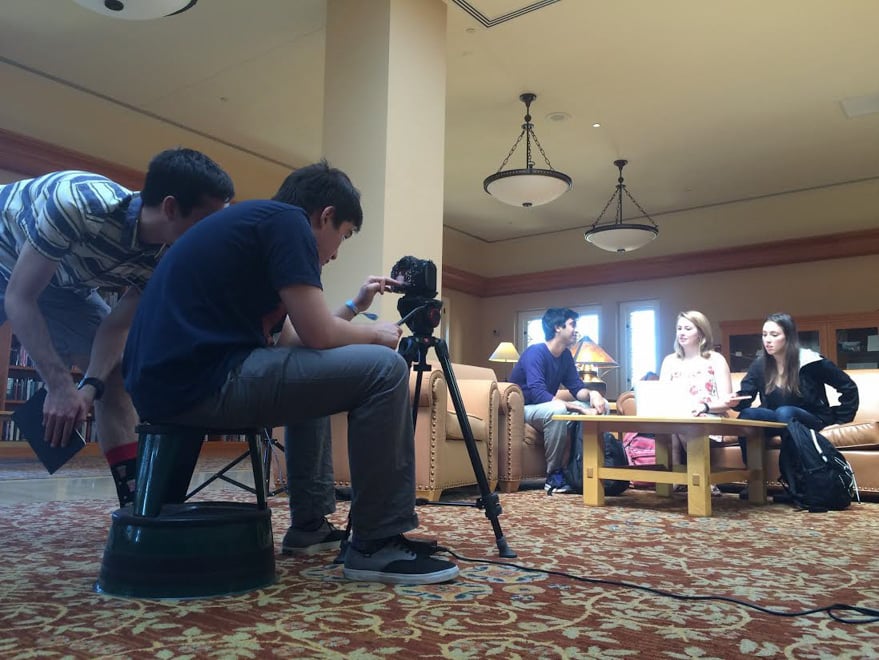“Cashoe,” a cozy little short film by Spencer Slovic ’18, forges a promising path for filmmaking on campus. Slovic’s film (which makes its debut on Friday, April 14) is the latest effort from Cardinal Studios, the new student group aimed at centralizing student filmmaking here at Stanford. As Cardinal Studios gets more experience, they’ve been getting better. “Cashoe” is a logical next step, but of course there’s always room for improvement.
Basically, it’s the story of an awkwardly-named loner (Yash Saraf) trying to fit in with a newly found group of friends. One expresses genuine kindness towards him (starry-eyed Kathleen Kenealy). The other (tough-cookie Madison Perna) only sees him as a CS partner to be used and then tossed away. To fit in, he decides to buy an iPhone – with interesting consequences.
The usual problems that arise with early short films are present here. There never seems to be enough time to develop these disparate characters. Dialogue is brisk and lively at many points, clip-clopping and sketchy at others. The immediacy of an over-rehearsed, wooden line (“People around here, they’re just trying to make everyone around them act happy. Ya know what does that better? Alcohol!”) shrouds any subtlety the short film can build within itself. It also never seems to stick to one tone and milk it for all its worth. The concoction of loud parody (a hilarious close-up of a perfectly unscratched iPhone, as if it were still twirling in its display case, a bizarre ending) and hushed reality (an outstanding, John Cassavetes-like shot of Cashoe lost in the sea of drunken party-goers) never gels well.
Like Slovic’s film, Dylan Hunn’s score sounds stellar, even if it’s all over the place. From solemn guitar-needling (contemplative opening) to sparkling groovy-ness (the mysterious meet-cute), from warbling and lonely dance music to melodramatic horror – the score aims for many tones. It’s a tall order: There’s barely any time to address each emotion “Cashoe” wants to pursue. Given the shortness, through, the hints are enough.
But these complaints wash away when you reflect on what “Cashoe” excels at doing. It captures a mood – party in a closed, cramped space – with the utmost sincerity and respect for all parties involved. Lots can be said to reject the characterization of Perna, who plays a sullen girl cartoonishly (unrealistically?) mean to the hero. But she’s particularly good at capturing a type we often encounter at parties: the drunken, un-smooth wingman. Along with Saraf’s sweetness, Perna’s belligerence (“She has a BOY-friend … back home … ya know”) is worth the (free) price of admission alone.
“Cashoe” is best when it presents simple, clean visual poetry. A thousand words with a mysterious image. Along with the John Cass-like image, the greatness is derived from the depiction of quiet and panicky isolation unique to Silicon Valley. Everywhere we go in the film, we’re reminded of technology. Smartphones infiltrate every segment of our lives now. (It’s getting harder and harder to avoid social media if you don’t want it.)
Accordingly, Slovic’s best moments arrive when he focuses on the mournful, tinny quality of today’s Mac-attacked lives. The human voice is a merely processed thing; it reverberates in an empty hallway, a stand-in for our own isolation from our loved ones. The wall that separates college-age youth is built from an endless array of Snapchat filters, clack-clack-clacking Mac keyboards and Pavlovian dings that keep us chained to a mystical Web of deceit.
“Cashoe” digs at our obsession with technology’s “beauty.” Our hero needs an iPhone to be “connected” to his potential crush. In our day-to-day lives, we feel unsatisfying sensations of anti-climax, notifications from people who feel like they only existed on a platform, not in person. Across the board, we’ve come to favor a tech world over the real one. Cashoe’s professor, a droning man who loves the sound of his own voice, intones: “Computer science is just a mental exercise. In theory, you shouldn’t even need a computer.” Certainly, that’s the direction we’re headed in if the Digital Age keeps up its profound commitment to higher efficiency at the cost of a loss of quiet, human ephemerality.
Perhaps this alienation is why the film infrequently shines. It finds its emotional core when it earnestly observes Stanford life. For all its inconstancies, the spark of passion is here. At times, “Cashoe” is a powerful rumination about life on such a tech-driven, STEM-pushy campus like Stanford’s. Pushing this through a commitment to a tone would help bring this out. But the seeds have already been planted.
“Cashoe” premieres Friday, April 14, at 7 P.M. in Pigott Hall 113. It will be accompanied by short student films by Sonia Gonzalez (who is also the producer and assistant director of “Cashoe”), Yash Saraf (who stars in it) and Nicole Himmel.
Contact Carlos Valladares at [email protected].
